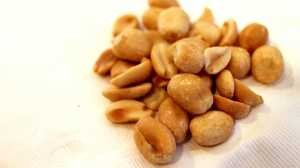
10 May NEJM: Viaskin Patch Shows Promising Results for Toddlers with Peanut Allergy
MedicalResearch.com Interview with:

Dr. Greenhawt
Matthew Greenhawt, MD, MBA, MSc
Professor of Pediatrics
Section of Allergy and Immunology
Director, Food Challenge and Research Unit
Children’s Hospital Colorado
University of Colorado School of Medicine
Anschutz Medical Campus
Aurora, CO 80045
MedicalResearch.com: What is the background for this study? Is the incidence of peanut allergy in toddlers stabilizing with the earlier introduction of peanuts?
Response: There exists an urgent unmet medical need for infants and toddlers living with peanut allergy. Peanut allergy affects approximately 2% of U.S. children and has been a growing public health problem over the past 20 years. In fact, the number of kids affected by peanut allergy has tripled in that time span. Peanut allergy is not likely to be naturally outgrown, and reactions can be severe.
However, there is hope. There is growing evidence that the allergic immune system is more modifiable early in life. The EPITOPE study evaluated Viaskin Peanut in children ages 1 – 3 years of age. Viaskin Peanut is an investigational epicutaneous immunotherapy (EPIT) product, which uses the skin as a route to desensitize a patient to be less reactive to peanut. This is a daily therapy, worn between the shoulders on the back, which allows for non-oral peanut desensitization, which many parents find highly appealing.
MedicalResearch.com: What are the main findings?
Response: The EPITOPE data revealed that after one year of treatment in toddlers ages 1 through 3 years old, Viaskin Peanut resulted in statistically superior desensitization compared with placebo. We were pleased to see that 67 % of toddlers on active treatment reached the primary endpoint, vs. 33.5 % on placebo, which is an excellent response rate. Moreover, this response rate was achieved with a high degree of safety. The patch was exceptionally well-tolerated, with the most commonly reported adverse events being local skin reactions that were mild-to-moderate and decreased in frequency through the duration of the trial. In terms of severe reactions there were just 4 cases (1.6%) of anaphylaxis related to the patch in the intervention arm.
MedicalResearch.com: What should readers take away from your report?
Response: Speaking as a study investigator, the findings from the EPITOPE trial demonstrate safe and effective peanut desensitization in children ages 1, 2, and 3 years old using the investigational Viaskin Peanut product. Moreover, these findings are very clinically meaningful. After just a year of study, 64% were able to increase the amount of peanut needed to trigger a reaction to 1000mg, which is a little more than 3 large peanut kernels, or between 4-5 peanut M&M pieces. This was all accomplished with the Viaskin 250 μg Peanut Patch, which contains 1/1000 the amount of peanut in a single kernel. There are currently no Food and Drug Administration (FDA) approved treatment options for toddlers under 4 years old. While this therapy is still under investigation and not approved by the FDA, it could one day fulfill a huge unmet medical need for children and their families. The study data show that Viaskin Peanut is a minimally invasive, non-oral treatment that presents minimal disruption to the child’s daily life, while still safely providing a high level of protection.
MedicalResearch.com: What recommendations do you have for future research as a results of this study?
Response: As an investigator and clinician, I believe the study shows that a daily, non-oral epicutaneous therapy is a potentially viable option to provide safe and effective peanut allergy treatment. I have confidence that the forthcoming safety study will continue to build on the excellent safety profile demonstrated in EPITOPE, as part of a robust data package for the FDA that can support what we as clinicians and investigators hope is a timely decision to approve a much-needed product for this age range.
Disclosures: Dr. Matthew Greenhawt, M.D.,MBA, MSc has received past research support to his institution, Children’s Hospital, Colorado from DBV Technologies, and the Agency for Healthcare Research and Quality; receives current research support from Novartis and Silota; is a consultant for Aquestive; is a member of physician/medical advisory boards for DBV Technologies, Nutricia, Novartis, Aquestive, Allergy Therapeutics, AstraZeneca, ALK-Abello, and Prota; is an unpaid member of the scientific advisory council for the National Peanut Board and medical advisory board of the International Food Protein Induced Enterocolitis Syndrome Association; is a member of the Brighton Collaboration Criteria Vaccine Anaphylaxis 2.0 working group; is the senior associate editor for the Annals of Allergy, Asthma, and Immunology, and is member of the Joint Taskforce on Allergy Practice Parameters. He has received honorarium for lectures from ImSci, RMEI Medical Education, MedLearningGroup, and multiple state/local allergy societies.
Citation:
Phase 3 Trial of Epicutaneous Immunotherapy in Toddlers with Peanut Allergy
Matthew Greenhawt, M.D., Sayantani B. Sindher, M.D., Julie Wang, M.D., Michael O’Sullivan, M.D., George du Toit, M.D., Edwin H. Kim, M.D., Deborah Albright, M.D., Sara Anvari, M.D., Nicolette Arends, M.D., Peter D. Arkwright, Ph.D., Philippe Bégin, M.D., Ph.D., Katharina Blumchen, M.D.,
May 11, 2023 N Engl J Med 2023; 388:1755-1766
DOI: 10.1056/NEJMoa2212895
The information on MedicalResearch.com is provided for educational purposes only, and is in no way intended to diagnose, cure, or treat any medical or other condition. Always seek the advice of your physician or other qualified health and ask your doctor any questions you may have regarding a medical condition. In addition to all other limitations and disclaimers in this agreement, service provider and its third party providers disclaim any liability or loss in connection with the content provided on this website.
Last Updated on May 10, 2023 by Marie Benz
